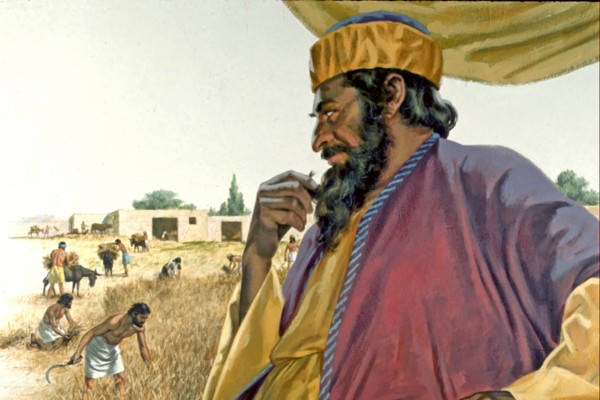“Teacher, tell my brother to share the inheritance with me.”
He replied to him,
“Friend, who appointed me as your judge and arbitrator?”
Then he said to the crowd,
“Take care to guard against all greed,
for though one may be rich,
one's life does not consist of possessions.”
Then he told them a parable.
“There was a rich man whose land produced a bountiful harvest.
He asked himself, ‘What shall I do,
for I do not have space to store my harvest?'
And he said, ‘This is what I shall do:
I shall tear down my barns and build larger ones.
There I shall store all my grain and other goods
and I shall say to myself, “Now as for you,
you have so many good things stored up for many years,
rest, eat, drink, be merry!$2"0$
But God said to him,
‘You fool, this night your life will be demanded of you;
and the things you have prepared, to whom will they belong?'
Thus will it be for all who store up treasure for themselves
but are not rich in what matters to God.”
Luke 12:13-21
As these two brothers were contending concerning the division of their paternal inheritance, it follows that one meant to defraud the other; but our Lord teaches us that we ought not to be set on earthly things, and rebukes the one that called Him to the division of inheritance; as it follows, "And he said to him, Man, who made me a judge or a divider over you?"
This our Lord says about the motives of the covetous, who seem to heap up riches as if they were going to live for a long time. But will wealth ever make you long lived? Why then do you manifestly undergo evils for the sake of an uncertain rest? For it is doubtful whether you will attain the old age for the sake of which you are collecting treasures.
Now it is our responsibility not to indulge in delights which fattening the body makes the soul lean, and bring a heavy burden upon it and spread darkness over it. Because pleasure makes our governing part, which is the soul, the slave, but the subject part, namely the body, the ruler. But the body is in no need of luxuries but of food, that it may be nourished, not that it may be racked and melt away. For pleasures are hurtful not to the soul alone, but to the body itself, because from being a strong body it becomes weak, from being healthy diseased, from being active slothful, from being beautiful unshapely, and from youthful old.
Now if one lives as if to die daily, seeing that our life is naturally uncertain, he will not sin, for the greater fear of death destroys every pleasure. But the rich man on the contrary, promising to himself long life, seeks after pleasures, for he says "Rest, eat, drink, and be merry", that is, with great luxury. For he who knows not how to use wealth amasses it in vain. Neither are these things ours which we cannot take away with us. Virtue alone is the companion of the dead, mercy alone follows us, which gains for the dead an everlasting habitation.
References:
Explanations on the Gospels (St. Theophylact of Ochrid)
Homily 39 on Corinthians 1 (St. John Chrysostom)
Commentary on St. Luke (St. Athanasius)
Commentary on the Gospel according to Saint Luke (St. Ambrose of Milan)
